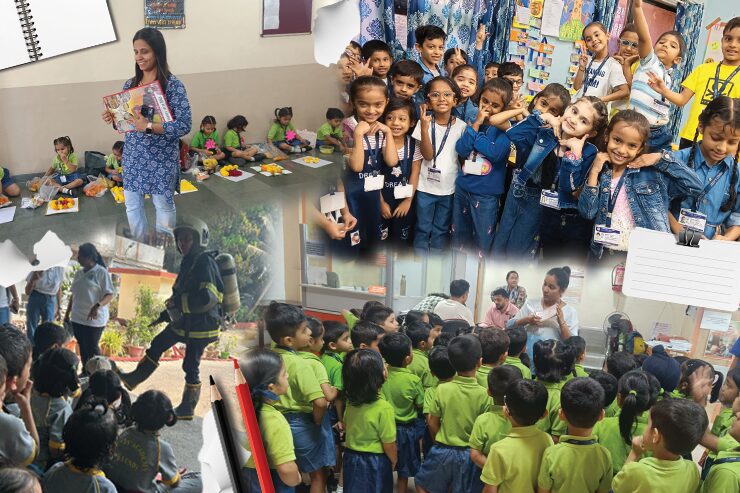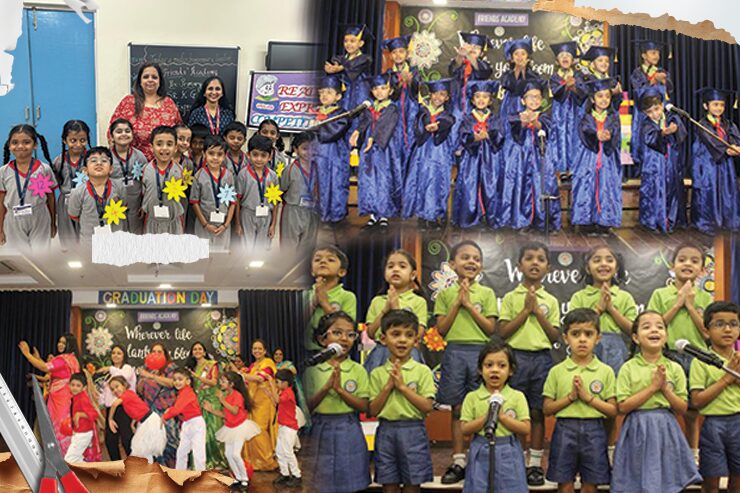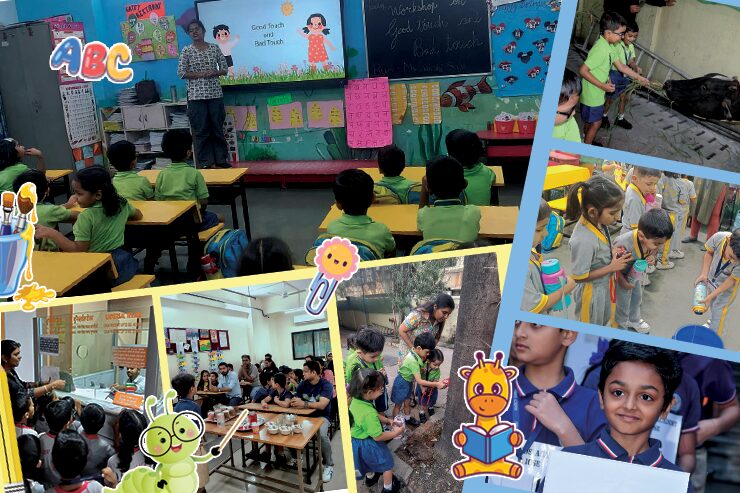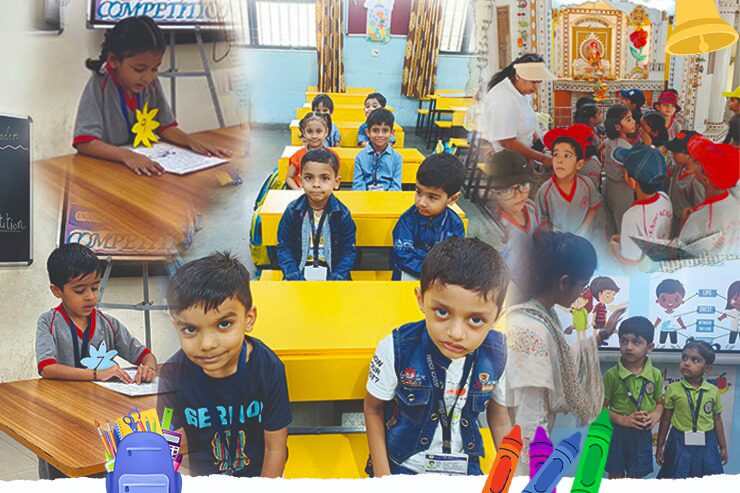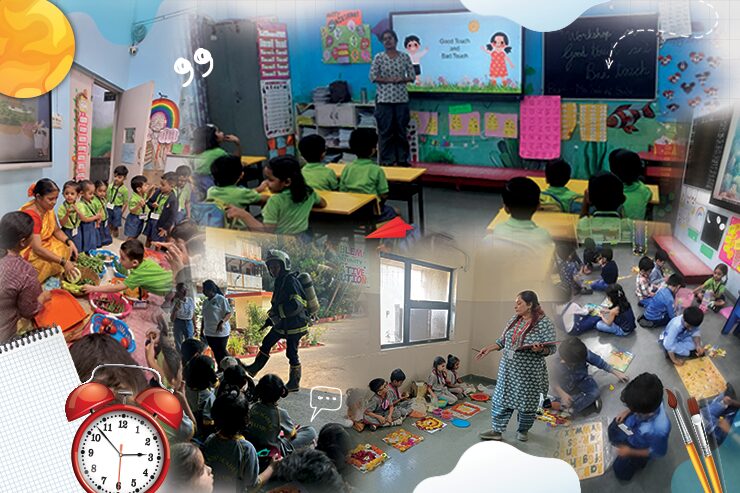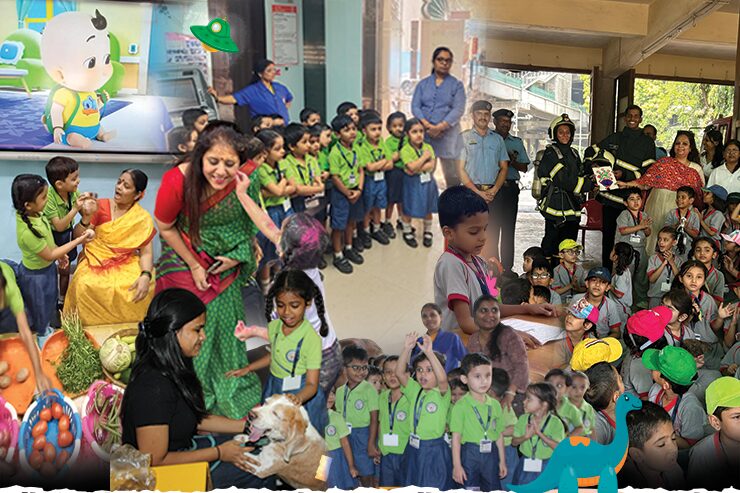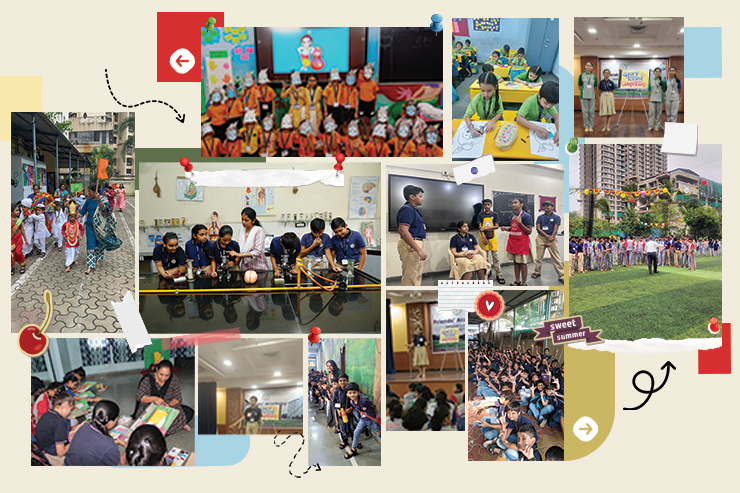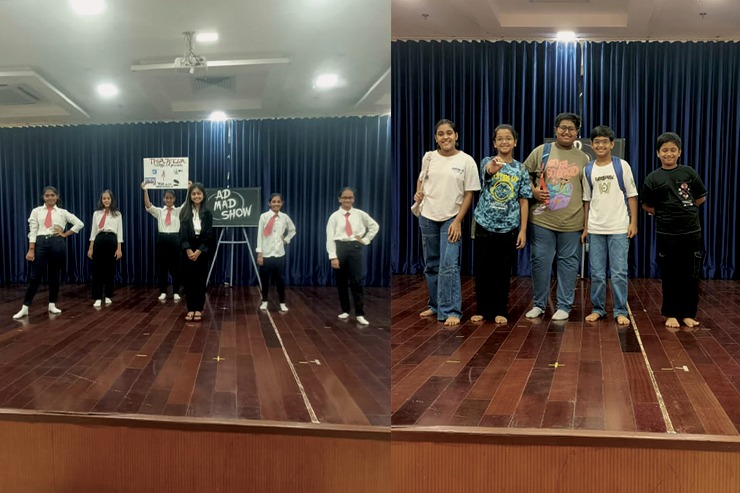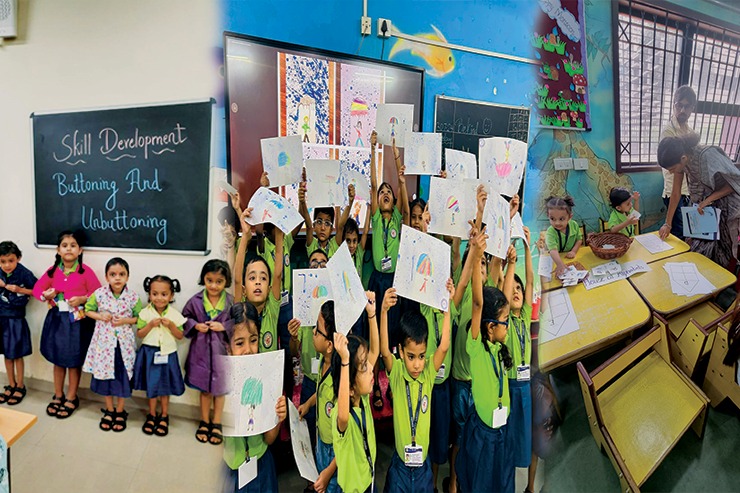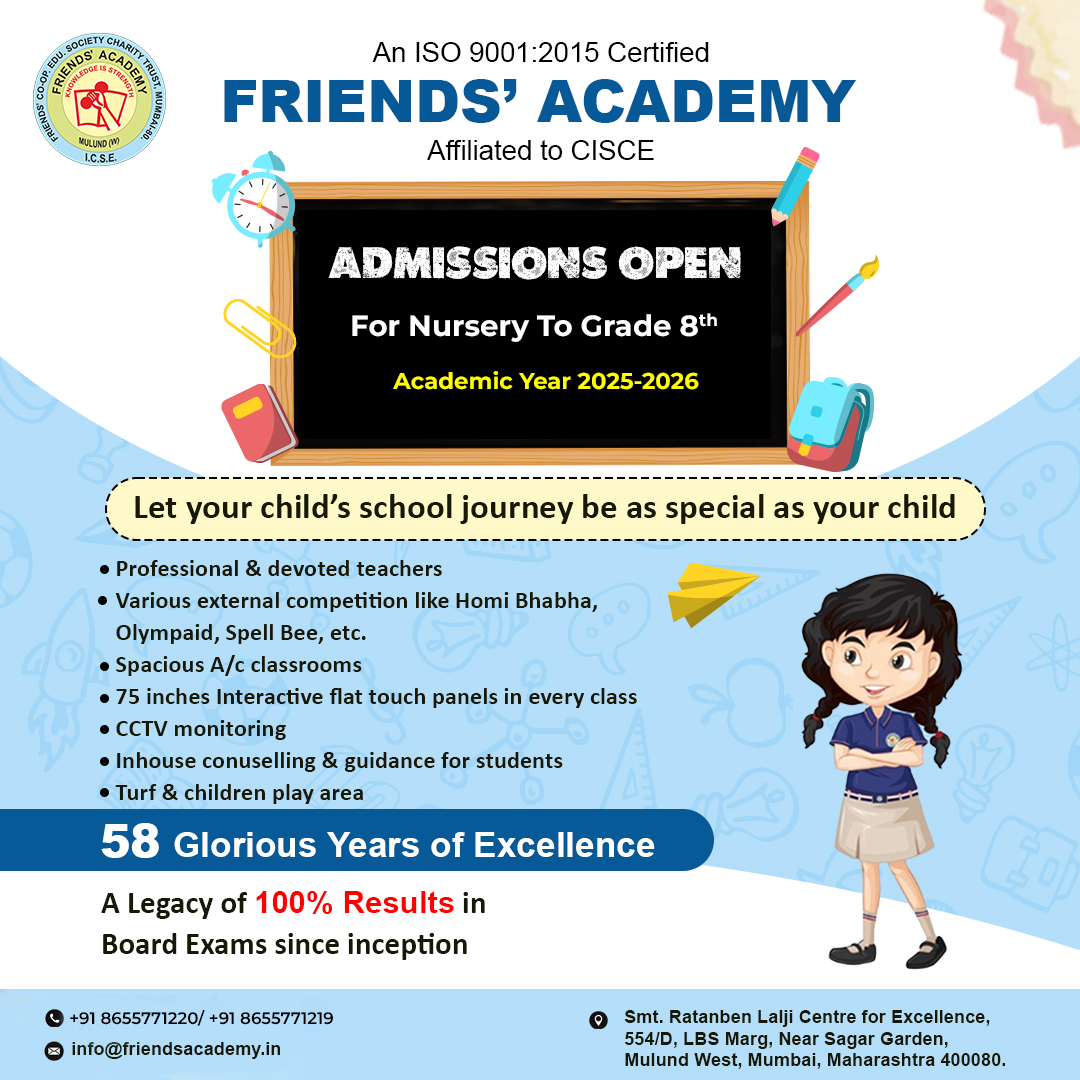During the early years of the child’s life, the best way to help your child grow is via Montessori teachings. While Montessori is a globally recognized approach, it is effective too. Developed by Dr. Maria Montessori has defined this process as a teaching methodology. It focuses on promoting curiosity, independence, and love for learning. Most schools consider this method—sometimes unknowingly—and help children receive the right foundation in learning. What Makes Montessori So Unique? At its core, the Montessori method respects each child’s natural developmental pace. Children are given the freedom to explore, make choices, and learn through hands-on experiences in a thoughtfully prepared environment. Rather than traditional teacher-led instruction, Montessori educators act as guides—observing, supporting, and stepping in only when needed. This is a true way to teach children, engage them in learning, and help them benefit from the process. Benefits of the Montessori Approach Encourages Independence: Montessori classrooms are designed to promote self-learning. Small activities help to develop responsibility and confidence that this encourages independence. These small activities like keeping things organized help children understand what independence is and how they can function without constant assistance. Focuses on Practical Life Skills: Beyond academics, children are taught real-life skills—folding clothes, preparing snacks, or organizing their belongings—helping them become capable and self-reliant. ICSE schools conduct such activities to ensure that children participate in practical tasks and learn these life skills. Promotes Deep Concentration: With minimal distractions and structured freedom, children can focus on tasks for extended periods, which naturally improves their attention span and problem-solving skills. Fosters Respect and Social Skills: Though students in the same class are often of the same age or have a 1–2 year age gap, this dynamic builds empathy, cooperation, and a sense of community. While these are basic skills, they are inculcated early to help children develop strong social abilities. Montessori at Friends’ Academy At Friends’ Academy, recognized among the best schools in Mulund, we embrace the Montessori approach in our early learning programs. Our classrooms are thoughtfully arranged with age-appropriate materials that encourage exploration, creativity, and joy in learning. Our trained educators provide a nurturing environment where every child’s curiosity is celebrated and individual strengths are developed. We believe that early education should not just be about memorizing facts—it should be about discovering the world, understanding oneself, and building the confidence to take on life’s many adventures. If you’re seeking a primary school in Mulund that empowers your child with the best start in life, choose the path that celebrates individuality, independence, and imagination—choose Montessori learning, choose Friends’ Academy.
Your child doesn’t just learn alphabets and numerics during the foundation year—it’s more than that. It’s about touching, tasting, listening, and exploring the world with all five senses. This is where sensory play becomes an essential tool in early childhood development. Hence, most schools in Mulund, especially ICSE Board schools, focus on understanding the sensory needs in early childhood. Sight, sound, touch, taste, and smell—all of these senses can be well developed via sensory play activities. Whether it’s playing with textured toys, finger painting, or listening to soothing sounds, each experience helps build neural connections in the brain’s pathways, which are crucial for cognitive growth. Why is Sensory Play Important? Boosts Brain Development: Simple activities like sorting colored beads or squeezing clay enhance problem-solving skills, memory, and attention span. Most ICSE schools consider or plan studies or introduce a few things through simple activities to promote these skills. Encourages Language Skills: When children describe what they feel—happy, sad, cold, heavy, or something disturbing—they expand their vocabulary and communication abilities. Communicating within the classroom or with others boosts their confidence in communication. Improves Fine Motor Skills: Holding a paintbrush or pinching play dough strengthens muscles that later help in writing, buttoning, or tying shoes. Hence, small activities keep students engaged and help them develop motor skills. Enhances Social Interaction: Sensory stations often involve group play, encouraging children to take turns, collaborate, and share ideas. As this is the foundational stage, it becomes easier to understand small things with ease. Calms Anxious Minds: Certain sensory experiences—like sand play or water tables—help children manage emotions and reduce stress. These activities help kids ensure they enjoy their playtime and don’t just focus on ABCs and 1234. How We Nurture Sensory Learning at Our School At Friends’ Academy, one of the best ICSE schools in Mulund, we believe that learning begins with hands-on experiences. Our classrooms and play areas are thoughtfully designed with sensory-rich materials—from textured walls to interactive learning corners—that spark curiosity and creativity in every child. Through activities like gardening, storytelling with props, art exploration, and musical sessions, we ensure that sensory play is woven into the daily routine of our students. These moments not only bring joy but also lay a strong foundation for future academic and personal success. Besides, we have cultural activities and parent-student events to help kids grow and involve parents in their journey. We believe when children learn with their senses, they learn for life. Hence, if you’re looking for nursery schools in Mulund that nurtures your child’s imagination—connect with us.
Social skills are the foundation of a child’s emotional and academic success. In ICSE board schools, where holistic education is prioritized, group activities play a crucial role in fostering communication, teamwork, empathy, and problem-solving skills from an early age. Pre-primary education is the perfect stage to instill these values, ensuring that children develop into confident and well-rounded individuals. The Importance of Group Activities in Pre-Primary ICSE Schools ICSE schools emphasize experiential learning, making group activities an essential part of the curriculum. These activities not only enhance cognitive and motor skills but also teach young learners essential social behaviors, such as cooperation, patience, and sharing. Key Group Activities That Foster Social Development Storytelling and Role-Playing: Group storytelling and dramatization allow children to express emotions, listen to others, and develop confidence in public speaking. In ICSE classrooms, integrating literature-based learning through role-play enhances language skills while promoting teamwork and creative thinking. Collaborative Art Projects: Activities like mural painting, craft-making, and building models in groups encourage cooperation, creativity, and respect for others’ perspectives. These projects also help students develop fine motor skills while strengthening peer connections. Circle Time Discussions: A common practice in ICSE pre-primary classrooms, circle time provides a platform for students to share their thoughts, listen actively, and develop respect for diverse viewpoints. It fosters a sense of community, boosts confidence, and improves communication skills. Group Games and Outdoor Play: Interactive games such as relay races, treasure hunts, and team-based sports teach children important life skills like teamwork, patience, and fair play. The ICSE curriculum integrates outdoor activities to enhance both physical and social development. Music and Dance Sessions: Participating in group singing, dancing, and rhythm exercises allows children to develop coordination, cooperation, and non-verbal communication skills. These activities align with the ICSE approach of fostering self-expression through performing arts. How Friends’ Academy Implements These Strategies At Friends’ Academy, we understand that strong social skills are vital for lifelong success. Our pre-primary program integrates engaging group activities that promote teamwork, emotional intelligence, and a love for learning. Through carefully designed interactive sessions, we ensure that our students develop confidence, respect, and a collaborative spirit. As a leading ICSE school in Mulund, we are committed to creating an enriching environment where young minds can thrive socially, emotionally, and academically. By incorporating structured group activities, educators can nurture well-rounded individuals who are prepared to excel in both academics and interpersonal relationships.
The early years of learning are essential for building a strong foundation to carry higher values forward. Children at this stage are like sponges; they absorb new concepts, social cues, and life skills. One of the most effective methods that fosters learning is positive reinforcement. ICSE schools focus on holistic development and understand the importance of positive reinforcement during this crucial stage. What Exactly is Positive Reinforcement? Positive reinforcement refers to the practice of rewarding desirable behaviors to promote their repetition. Rather than focusing on punitive measures for mistakes, positive reinforcement promotes an environment where students are motivated to continue their good behavior and academic efforts. In early childhood, rewards could range from verbal praise to small tangible rewards or even additional privileges. The Impact of Positive Reinforcement in Early Childhood At Friends’ Academy, we believe that positive reinforcement cannot be neglected, and hence, we actively implement it during the early learning years. Below are a few benefits that make this practice essential. 1. Builds Confidence and Self-Esteem In the formative years, children develop their self-worth and confidence based on their experiences in the classroom. When they are consistently praised for their efforts and achievements, whether it’s completing a task or exhibiting good behavior, they begin to feel competent. This boosts their self-esteem and motivates them to strive for success. We never miss praising our children, regardless of their section, as it keeps them motivated to move forward. 2. Encourages Active Participation Positive reinforcement fosters an environment where students are eager to participate. By rewarding active involvement in classroom discussions, group activities, and tasks, children learn the value of being engaged. It also helps them feel valued in the classroom community, encouraging them to contribute more. 3. Strengthens Desired Behaviors ICSE schools emphasize a balanced approach to learning, where good behavior is just as important as academic success. Whether it’s following instructions, being respectful to peers, or showing kindness, positive reinforcement strengthens these behaviors by making students realize the benefits of such actions. Over time, students internalize these behaviors, making them habitual. 4. Creates a Supportive Learning Environment Positive reinforcement helps create a nurturing and supportive classroom atmosphere. Children thrive in environments where they feel safe, encouraged, and appreciated. When teachers acknowledge and reward their efforts, it fosters a positive relationship between students and educators, paving the way for improved learning outcomes. Positive reinforcement is more than just a teaching tool—it’s a cornerstone of fostering a love for learning in the early years. By reinforcing good behavior and achievements, children in schools develop a strong foundation of self-belief, confidence, and curiosity. At Friends’ Academy, we continue to use this powerful method to ensure that every child has the opportunity to thrive academically and socially. At Friends’ Academy, we believe in nurturing young minds through positive reinforcement. Our teachers actively use praise, encouragement, and rewards to motivate students in their learning journey. By recognizing and celebrating their achievements—big and small—we help our students develop confidence, creativity, and a passion for learning. As an esteemed ICSE school in Mulund, we understand that positive reinforcement is not just about academic excellence but also about fostering emotional growth and social skills.
Early childhood education lays the foundation for a child’s academic, social, and emotional development. In ICSE schools, where the curriculum emphasizes holistic learning, it is essential to adopt engaging, interactive, and student-centered teaching strategies. Here are some of the best teaching methodologies for early childhood education in an ICSE setting: 1. Play-Based Learning Young children learn best through play. Incorporating educational games, role-playing, and interactive storytelling enhances creativity, problem-solving skills, and cognitive development. Play-based learning aligns well with the ICSE curriculum, which promotes activity-based education. 2. Experiential Learning Children grasp concepts better when they experience them firsthand. Teachers can introduce hands-on activities, nature walks, science experiments, and sensory play to make learning fun and meaningful. The ICSE syllabus encourages experiential learning to develop critical thinking and analytical skills. Hence, most schools incorporate different experiments that help children memorize concepts easily. 3. Interactive Teaching Methods Encouraging participation through group discussions, question-answer sessions, and classroom debates fosters confidence and communication skills. The ICSE curriculum emphasizes concept-based learning over rote memorization, making interactive teaching highly effective. This is one of the best ways to help children improve their interaction with others. 4. Storytelling and Literature-Based Learning Storytelling fosters imagination, comprehension, and language development. Teachers can introduce folk tales, fables, and age-appropriate literature, linking them with moral values and real-life applications to make learning impactful. Additionally, skits and dramas can enhance learning in a more effective manner. 5. Technology-Integrated Learning Smart classrooms, digital storytelling, and educational apps help make learning engaging. E-learning resources, interactive videos, and gamified lessons align well with the ICSE’s modern educational approach while catering to different learning styles. 6. Inquiry-Based Learning Encouraging curiosity through questions, exploration, and experimentation helps develop an inquisitive mindset. Simple activities like “Why does the sun rise?” or “How do plants grow?” stimulate critical thinking, an essential part of the ICSE education philosophy. Learning based on real-world questions helps children grasp fundamental concepts quickly. 7. Social and Emotional Learning Fostering emotional intelligence and interpersonal skills is crucial in early childhood education. Teachers should focus on collaborative learning, teamwork, kindness, and mindfulness activities to create a positive classroom environment. Effective teaching strategies in ICSE early childhood education focus on fostering creativity, critical thinking, and experiential learning. By implementing interactive, student-centered, and multi-sensory teaching methods, educators can lay a strong foundation for young learners, preparing them for future academic success and holistic growth. For schools looking to enhance their early childhood education program, integrating these methodologies will ensure a dynamic, engaging, and enriching learning experience for young minds. At Friends’ Academy, we employ the best teaching methodologies that help your child focus, grow, and learn. We understand that at every stage, a child requires new and engaging learning methods to stay interested in studies and pursue their dreams. As the best ICSE school in Mulund, we take pride in providing students with every facility and opportunity needed to help them learn and thrive.
Different types of education offer different perspectives to a child, shaping their mind in unique ways. Before your child enters pre-primary, it is essential to understand the different teaching methods available. With the evolution of education, various approaches have been adopted. One such method integrated by ICSE schools is Montessori education. What is Montessori Education, and How Does It Influence Your Child? Montessori education is not rocket science—it simply defines a child-centric teaching method that emphasizes hands-on learning, self-directed activities, and collaborative play. Here’s how Montessori education influences pre-primary kids: Prepared Environment Montessori classrooms are designed to encourage independent exploration with appropriate materials. This is one of the best ways to ensure that children become interactive and enjoy their learning journey. Multi-Sensory Learning Children engage in practical life activities, sensorial experiences, and language development at their own pace. Freedom with Structure While children have the freedom to choose their activities, there is a structured framework in place to ensure a well-rounded learning experience. How Does Montessori Influence Pre-Primary Kids in ICSE Schools? Montessori learning blends seamlessly with the ICSE curriculum, providing children with the right foundation for learning. Here are some key ways Montessori methods influence young learners: Encourages Independent Thinking Montessori activities foster problem-solving skills and decision-making, helping children develop confidence in their abilities. This boosts their creativity and critical thinking skills. Hands-On Learning Approach Interactive tools such as Montessori blocks, sandpaper letters, and number rods help children understand concepts in a concrete way before moving to abstract learning. This makes education engaging and fun, encouraging active participation. Stronger Foundation in Literacy & Numeracy With a structured phonics-based approach and practical math activities, children develop strong reading and number skills early on. Social & Emotional Development Mixed-age classrooms and collaborative learning promote teamwork, patience, and respect for peers. Smooth Transition to Formal Education Since Montessori nurtures curiosity and self-discipline, children adapt seamlessly to structured learning in higher ICSE grades. Conclusion The Montessori-ICSE blend is a game-changer for pre-primary education, offering a nurturing, engaging, and structured learning environment. By fostering independence, creativity, and critical thinking, this approach helps children develop essential life skills while preparing them for future academic success. At Friends’ Academy, we understand the importance of implementing innovative teaching methods to ensure our students receive the best learning experience. Looking for a pre-primary school that embraces Montessori learning within an ICSE framework? Choose Friends’ Academy and give your child an early start filled with curiosity, exploration, and growth!
Teachers are often referred to as second parents, but does that mean parents should take a backseat in their child’s education? Absolutely not! We at Friends’ Academy, ICSE school, actively encourage parental involvement in various school activities. Beyond annual school fests and parent-teacher meetings, numerous opportunities allow parents to engage with their children’s academic and extracurricular journey, fostering their overall success. How Parent-School Collaboration Enhances a Child’s Growth at Friends’ Academy? Establishing Goals for Academic Success While teachers track student progress at school, parents play an equally crucial role at home. Consistent communication between teachers and parents ensures that students receive the necessary guidance and encouragement. At Friends’ Academy, our teachers actively engage with parents through WhatsApp and other communication channels to provide regular updates about their child’s progress. This proactive approach helps align educational goals and fosters a supportive learning environment. Open Communication Between Parents and Teachers Transparency is key to student development. Parents should share important details about their child’s school experience, challenges, and achievements, allowing teachers to offer better support. At Friends’ Academy, we prioritize continuous communication with parents, ensuring they are well informed about their child’s academic performance and emotional well-being. Encouraging Parents to Participate in Activities Parents play an integral role in shaping their child’s experiences. Friends’ Academy, being ICSE School, has designed our events in a manner that actively allows parents to participate alongside their children in events such as Grandparents’ Day, Mother’s Day, Father’s Day, Sports Day, and Cultural Day. These engagements not only create cherished memories but also help parents observe their child’s interests and talents, fostering stronger family bonds. Supporting Learning at Home Education extends beyond the classroom. Our teachers guide parents on how to assist their children with homework, develop strong study habits, and reinforce essential life skills. By incorporating storytelling, teaching manners, and problem-solving techniques, parents contribute to a child’s holistic development. Effective collaboration between teachers and parents ensures that children receive consistent support both at school and at home. The Power of Collective Effort When parents, teachers, and students work together, the learning experience becomes more interactive and impactful. Regardless of whether your child studies in an ICSE school or another board, parental involvement is crucial for their academic and personal growth. By staying engaged, parents can better understand their child’s needs and provide timely support. Want to learn more about how we keep children engaged through various activities? Click Here. Looking for an ICSE School? Friends’ Academy is now accepting applications for the 2025-26 academic year. Contact us today!
Education plays a crucial role in shaping a child’s future, but it goes beyond academic excellence. A well-rounded education ensures that students are equipped with the skills and knowledge to thrive in all aspects of life. ICSE schools are renowned for their comprehensive curriculum, fostering soft skills, social exposure, intellectual growth, and physical well-being. Does Holistic Development in Children Matter? Yes, holistic development is essential, as it lays the foundation for a child to grow into a well-rounded individual. This approach nurtures multiple dimensions of development—academic, emotional, social, and physical. Skills such as critical thinking, communication, and problem-solving are integral to this growth. ICSE schools integrate holistic development through a balanced curriculum, innovative teaching methodologies, extracurricular activities, and moral education. While the curriculum remains consistent across ICSE schools, the key differentiator lies in how they nurture students beyond academics. How ICSE Schools Nurture Holistic Development? Strong Focus on Communication and Languages Communication is a vital life skill, and ICSE schools emphasize enhancing students’ language proficiency. Various activities, such as debates, elocution, storytelling, and creative writing, help build confidence in students. Besides English, Hindi, and regional languages, ICSE schools often offer foreign languages, giving students an edge in global communication and opportunities for higher education abroad. Encouragement of Practical Learning ICSE schools integrate hands-on learning experiences through experiments, research assignments, and projects. Well-equipped science laboratories, interactive teaching methods, and computer labs encourage students to apply theoretical knowledge to real-life scenarios. This approach fosters innovation, creativity, and analytical thinking, which are essential for future careers. Focus on Moral and Ethical Education Character-building is an integral part of ICSE education. Schools instill values such as integrity, empathy, and responsibility through moral education, storytelling, and discussions. This helps shape socially responsible individuals who contribute positively to society and develop strong ethical foundations. Comprehensive and Balanced Curriculum ICSE schools follow an extensive syllabus that promotes deep learning and conceptual clarity. Unlike rote learning, ICSE focuses on understanding subjects in depth, making students proficient in languages, sciences, mathematics, and social sciences. This rigorous approach helps develop analytical thinking and problem-solving skills, essential for real-world applications. Emphasis on Co-curricular and Extracurricular Activities ICSE schools go beyond textbooks to provide students with opportunities in arts, dance, music, drama, and sports. These activities enhance cognitive skills, leadership abilities, teamwork, and emotional intelligence. They also foster self-expression and confidence, preparing students for diverse career paths. The Role of Schools and Parents in Holistic Development While holistic development benefits children immensely, ICSE schools play a crucial role in implementing it effectively. However, the responsibility doesn’t lie solely with the schools; parents and teachers must work together to ensure a supportive learning environment. We at Friends’ Academy understand that children spend a significant portion of their time in school; it becomes imperative for educators to instill values, skills, and knowledge that shape their future. If you are looking for an education that goes beyond textbooks and fosters all-round growth, enrolling your child in an ICSE school could be the best decision for their future. The blend of academics, extracurriculars, and ethical learning ensures they emerge as empowered individuals, prepared for success in every sphere of life.
ICSE Board School Admissions are likely to start next year, but preparation for parents begins early. The admission process may seem overwhelming, but it becomes manageable if you’re aware of certain key aspects. If you’re a parent looking to help your child gain admission to an ICSE Board School, here are a few tips to make the preparation process smoother for both you and your child. 1. Know the Curriculum Understanding the ICSE Board curriculum is crucial. Each school has its own set of priorities, facilities, and academic standards. Knowing the ICSE Board curriculum helps you focus on developing your child’s analytical and reasoning skills, along with a deep understanding of core subjects. The curriculum emphasizes English, Science, and Mathematics. It’s also important to familiarize yourself with the integration of practical learning, which differentiates ICSE from other boards. 2. Identify the Right ICSE School Selecting the right ICSE school in Mumbai can be challenging with several options available. Start by researching potential schools, reviewing their admission criteria, and checking parent and student feedback. Also, evaluate the proposed curriculum to ensure that the school offers a holistic development plan. Involve your child in the process, allowing them to participate in choosing their preferred schools. 3. Start the Admission Process Early Starting the admission process early ensures you’re aware of deadlines, entrance exams, and necessary preparations. Although the process typically begins in January or February for the academic year 2025-26, you can begin contacting ICSE schools earlier to stay updated on deadlines and other requirements. 4. Prepare for the Entrance Exam Many ICSE schools require an entrance exam, particularly for higher grades. Your child will need to focus on core subjects like English and Mathematics. The difficulty level of the entrance exam depends on the grade for which they are applying. Here are a few preparation tips: Study Basics: Focus on fundamental concepts in English, Math, and Science. Practice Papers: Assist your child with previous years’ papers or sample questions to get familiar with the format. Time Management: Help your child develop time management skills to ensure they complete the test within the allotted time. 5. Encourage Reading and Communication Skills ICSE schools place a strong emphasis on English proficiency. For younger children, focus on foundational skills like reading stories, learning the alphabet, and improving cognitive abilities. For older children seeking primary or secondary admissions, encourage them to read books regularly, which helps improve their overall knowledge and communication skills—important aspects of the interview process. Written practice is equally essential. 6. Keep a Record of Extracurricular Activities ICSE schools emphasize holistic education, and it’s important for your child to be active in both academics and extracurricular activities. If your child is involved in sports, arts, music, or community service, collect certificates or records of participation. This will help them continue developing their hobbies and showcase their well-rounded profile. 7. Develop a Routine Consistency is key, so establishing a structured routine for your child is important. A balanced lifestyle that includes physical activity, relaxation, and study time will foster better time management and reduce stress. As your child follows this routine, you’ll notice positive behavioral changes that will benefit their future. 8. Emphasize Confidence and Positivity Lastly, help your child stay positive and confident throughout the admission process. It’s important to remind them that this is just the beginning of their educational journey. Encourage them to do their best, but also let them know that the outcome does not define their abilities. If you have possible resources you can enroll your child in mock interviews or practice tests. Conclusion Preparing your child for ICSE Board School admissions requires a blend of academic readiness, personality development, and an understanding of the school’s values. Start early, stay organized, and ensure your child is mentally and academically prepared. With the right support, they’ll be ready to take this important step towards a bright future. At Friends’ Academy, we understand the importance of timely and effective preparation. We offer multiple resources to guide you and your child through the admission process. If you’re seeking assistance or looking to secure admission at our school, you can connect with us here.
Pre-primary school is a foundational base for your child, hence, making an essential decision such as choosing the right school becomes necessary. With several boards, and the curriculum choosing or knowing any curriculum and its offering becomes necessary. Each one is developed with a specific perspective and serves the needs of formal education. As a parent, you need to know several things and understand what your child will learn when seeking pre-primary admissions. Here is what the ICSE Pre-Primary Curriculum has to offer: 1. Social and Emotional Development Pre-primary students are usually young, and the curriculum is designed in a way that prepares them to step into the real world. To aid their social and emotional development, the syllabus includes topics that encourage interaction with peers, understanding of emotions, confidence building, and developing a positive self-image. 2. Boosting Creativity The ICSE pre-primary school curriculum is created after considering multiple aspects, allowing the integration of extracurricular activities. Activities like painting, drawing, music, and dancing help children express their feelings. This is one of the best activities some schools may not emphasize, but it plays an essential role. 3. Physical Development As mentioned, pre-primary students are often engaged in extra-curricular activities, making them more likely to experience physical development. Activities such as running, jumping, and climbing help enhance motor skills while drawing and painting assist in developing good eye-hand coordination. 4. Exploring via Activities Although pre-primary students have a limited syllabus, the teaching methods in ICSE schools offer a generous approach to learning. Incorporating the Play and Learn Method helps students memorize quickly. The activities included encouraging the use of the senses and helping students understand how to use their bodies to perform different tasks. 5. Learn, Learn, and Learn It is a common goal for parents to provide their children with a good education. The ICSE Board curriculum, however, focuses on helping children learn in a fun manner while developing the necessary skills to face the real world. Numeracy, alphabet, reading, writing, and communication skills are foundational and help your child understand and solve problems. This approach fosters creativity, curiosity, and analytical thinking. Providing a Nurturing Environment In addition to these core areas, a quality pre-primary school should provide a safe, nurturing, and stimulating environment that fosters children’s overall development. Look for schools that prioritize play-based learning, small class sizes, and qualified teachers. Also, check the amenities that help children explore different activities and discover new interests. Choosing the Right School When selecting a pre-primary school, consider factors such as the school’s curriculum, facilities, teachers, and reputation. Visiting the school and speaking with teachers and parents can also provide valuable insights. Remember, a strong foundation in pre-primary education can set your child up for success in their future academic endeavors.

